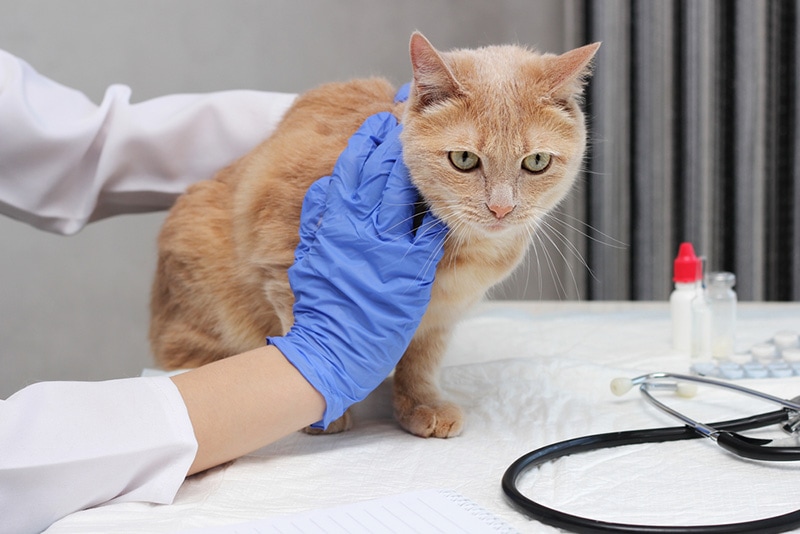
Click to Skip Ahead
Brain tumors in cats are not unheard of. That said, a cat has a 0.0035% chance of obtaining a brain tumor in their life—an exceptionally low chance. This statistic, however, doesn’t make it easier for those with cats that have this diagnosis.
Just like humans, cats are at risk of getting cancer, and understanding what you should be looking for plays a huge part in early detection and hopefully, treatment options.
What Are Brain Tumors in Cats?
A brain tumor is simply defined as a mass in the brain. There are different types, and they may be primary (originating from the brain) or secondary (spreading from other parts of the body). These tumors may be malignant or benign. However, in the brain, there is a delicate balance of pressure that when disturbed, can be fatal. For example, a benign tumor that grows large enough can cause an increase in pressure on the brain that is fatal, an instance called biologic malignancy.
The prevalence of brain tumors increases when a cat is over 5 years of age, and it is thought that male cats have a slight predominance of getting a brain tumor compared to females. A meningioma is the most common brain tumor in cats.
What Are the Signs of Brain Tumors in Cats?

Brain tumors can be slow growing, and the brain sometimes manages to adapt to the change in pressures associated with the growth. At this stage, there may only be a slight behavior change or vague signs that something isn’t quite right. In cases of fast-growing tumors, the clinical signs may manifest rapidly, with neurological dysfunction (such as seizures) being the first clinical sign that a cat experiences.
What Are the Causes of Brain Tumors in Cats?
Unfortunately, the exact cause of brain tumors remains unknown. It’s not clear what causes the growth of abnormal cells. It is suspected that a combination of factors contributes to the growth of tumors, including the environment, genetics, diet, immune system, and chemical exposure.
How Do I Care for a Cat With a Brain Tumor?

Having a pet diagnosed with a brain tumor is understandably devastating, no matter their age. Neurological signs can be frightening to witness and unsettling for your pet to experience. If your cat has been diagnosed with a brain tumor, working with your veterinarian to either figure out treatment or make them as comfortable as possible is crucial.
There are a few options that you may be presented with, which are entirely dependent on the severity of your cat’s clinical signs and whether you have the financial capacity to consult a neurologist. Sometimes, a brain tumor is simply a presumptive diagnosis that your veterinarian reaches by exclusion. But consulting a specialist neurologist for more specialized diagnostics is expensive, and if your cat isn’t covered by insurance, finances can be a limiting factor in proceeding with further care. If your cat (especially if they’re older) has sudden onset neurological signs that worsen steadily over time (despite treatment) and other conditions have been ruled out, a diagnosis of a brain tumor may be an educated guess made by your veterinarian. At this level, treatment will be aimed at keeping your cat comfortable until their quality of life suffers. They may be able to go on steroids or seizure medication to keep them more comfortable for longer.
Ideally, every patient should be able to go to a neurologist, where they can receive further diagnostics and a plan with the oncology team. Depending on the type of tumor diagnosed and how advanced it is, treatment can include surgical removal, radiation therapy, and chemotherapy.
If your pet receives a terminal diagnosis, veterinary care involves end-of-life treatment. The main objective is to avoid any prolonged or unnecessary suffering, so if you feel that your cat is deteriorating, and they have little to no quality of life, you can talk to your veterinarian about navigating palliative treatment options and euthanasia. End-of-life care is as much about supporting the pet’s owner and family through the process as the patient themselves.
Frequently Asked Questions (FAQs)
How Are Brain Tumors Diagnosed in Cats?
The only definite way to diagnose a brain tumor in cats is through certain imaging techniques (such as CT and MRI) and to determine the type of cancer, a biopsy. Since a brain tumor is a tumor of the soft tissue of the brain, you cannot see this on an X-ray of the skull. This usually means specialist involvement with a neurologist or oncologist.
Before the diagnostics get to this level, however, your veterinarian will usually have completed a neurological assessment, blood tests, and other diagnostic tests, such as urine analysis, ultrasound of the abdomen, and X-rays of the chest. Any sudden onset neurological signs in an older cat will put a brain tumor on the veterinarian’s differential diagnosis list. However, tests that are done at a general practice are designed to rule out any other potential causes of the clinical signs that your cat is demonstrating and for the vet to be able to get a full clinical picture in order to advise the next steps.

What Is the Prognosis for Brain Tumors?
The prognosis for animals with brain tumors is generally guarded, but it depends on the type of tumor, treatment options, speed of growth, and surrounding tissue damage. That said, cancer treatment for pets has made major strides in recent years, and there are currently options that may determine a better outcome for your cat. For example, for a specific tumor called a meningioma, if surgical removal is pursued, survival time post-surgery is estimated to be 2 years. Whether your cat is a good candidate for surgery, chemotherapy, or radiation depends on your own circumstances, how aggressive the cancer is, and if it has already spread. A secondary tumor has a poor prognosis, as it means the primary tumor (which can originate anywhere in the body) has already spread.
Conclusion
While your cat has a very low chance of being diagnosed with a brain tumor in their lifetime, if they are on the receiving end of this diagnosis, know that you have the support of your veterinary team through what is likely to be an upsetting and stressful time. Different types of brain tumors usually involve specialist referral for diagnosis and treatment. Depending on the type and location of the tumor, treatment can have a good outcome. However, for other patients, palliative treatment and humane euthanasia may be more appropriate.
Featured Image Credit: Katerina Varnakova, Shutterstock







